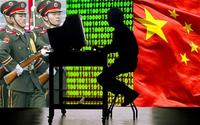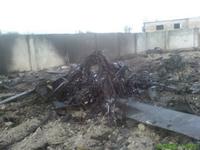-
Chinese TV shows cyber-attack software
A Chinese government TV station, perhaps inadvertently, shows a government cyberattack aimed at Falun Gong computers; the video identifies the software as being written by the Electrical Engineering University of the People’s Liberation Army; the video — which has been removed from the TV station’s Web site — provides direct evidence of Chinese government involvement in cyberattacks
-
-
Cyber experts dispute McAfee's Shady RAT report

Earlier this month, cybersecurity experts discovered a five-year operation that infiltrated U.S. government and UN computer networks; China is believed to be the culprit behind the systematic attacks, dubbed “Operation Shady RAT,” which also hit major defense contractors and private businesses; many within the cybersecurity community are disputing the significance of the finding
-
-
Pakistan likely let China examine U.S. stealth helo

U.S. intelligence officials believe that Pakistan’s intelligence service allowed Chinese military engineers to examine the wreckage of a new stealth helicopter used in the raid that killed Osama bin Laden; the helicopter was damaged in the assault on bin Laden’s compound in Abbottabad, Pakistan in May and Navy SEALs were forced to leave it behind
-
-
Senator Schumer targets fake IDs from China
Fake IDs have long been a problem for law enforcement agencies, but the recent discovery of counterfeit IDs from China that appear nearly identical to the real thing have lawmakers particularly concerned
-
-
China's sustained cyberattacks on U.S. are an economic, strategic threat
China has been engaged in a sustained guerrilla cyber war against the United States, with two goals in mind: first, stealing research and development, software source code, manufacturing know-how, and government plans; second, to counter American military superiority by threatening to damage the underpinning of the U.S. economy; that Congress and the administration do nothing in the face of these cyber assaults is puzzling
-
-
Pakistan charges 5 with helping U.S. kill OBL
Pakistan arrested five men and charged them with leaking information relating to the 2 May killing of Osama bin Laden; no, they were not accused of being informants for al Qaeda or the Taliban; rather, they are charged with secretly providing information to the united States — information which led to the successful operation; among the detainees are the Pakistani who rented and maintained to safe house in Abbottabad , from which CIA operatives kept an eye on bin Laden’ compound, and a Pakistani Army major who is credited with photographing the license plate of the car of bin Laden trusted couriers; following the courier’s car was the key to locating bin Laden’s hideout; deputy CIA director, when asked to rate Pakistan’s cooperation with the United States in fighting terrorism, replied: “Three”
-
-
Bill prohibits joint U.S.-China scientific activity
Language inserted into the 2011 spending bill would prohibit any joint scientific activity between the United States and China that involves NASA or is coordinated by the White House Office of Science and Technology Policy (OSTP); Rep. Frank Wolf (R-Virginia), the author of the prohibition, says: “China is spying against us, and every U.S. government agency has been hit by cyberattacks —- They are stealing technology from every major U.S. company. They have taken technology from NASA, and they have hit the NSF computers. —- You name the company, and the Chinese are trying to get its secrets”
-
-
Huawei tries to crack U.S. market again with U.S. Cellular deal
Chinese giant Huawei Technologies Co. recently announced that it was the finalist for a contract to build a fourth generation wireless network for U.S. Cellular Corp, the nation’s sixth largest wireless carrier; in response to the deal, U.S. lawmakers sent a letter to President Obama to permanently stop Huawei’s efforts to sell network infrastructure in the United States; in the past, lawmakers have vocally opposed Huawei’s attempts to enter the U.S. market fearing that the telecom giant would install equipment that contains bugs that would make it easier for China to steal information, shut down communications, or make networks easier to hack; Huawei is the world’s second largest telecom manufacturer
-
-
Safeguarding the private and public sector from insider threats
While most discussion of insider threats have focused on cyber security concerns, a recent panel at the Government Security Convention and Expo in Washington, D.C. discussed the potential physical threats posed by insiders;businesses, government agencies, and other organizations are vulnerable to a host of threats from insiders including corporate espionage, workplace violence, and the loss of sensitive materials or data; panelists discussed efforts to reform the Federal Protection Services, which is charged with securing roughly 9,000 federal facilities, the latest technologies in detecting cell phones in secure areas, new body scanners, as well as the legality of stepped up security measures
-
-
Relying on technology to prevent another WikiLeaks
After the WikiLeaks scandal leaked hundreds of thousands of classified documents from military networks, the U.S Intelligence Community (IC) is grappling to find the right balance between information sharing and protection; IC’s information sharing executive says the government is relying on technological solutions to protect data while also sharing information across intelligence agencies; technological solutions will be implemented in a two-pronged approach over the next two years; implementation of these additional security measures is on schedule and the IC’s chief information officer expects to be able to assign security certificates to IC personnel by the first quarter of FY2012
-
-
U.S. rebuffs Huawei fearing company is proxy of China
Last month the U.S. government rebuffed another attempt by Chinese telecom giant Huawei Technologies Co. to enter the U.S. market when it ordered the company to immediately stop its partnership with 3Leaf Systems; the government has blocked similar deals in the past; U.S. officials claim that Huawei is a dangerous extension of the Chinese government and is determined to steal state secrets; Huawei is one of China’s largest companies, providing products to forty-five of the world’s top fifty telecom operators in over 100 countries; observers believe that the U.S. government’s distrust of Huawei stems from its general frustration with cyber attacks emanating from China
-
-
Insider threat problem topic of a GovSec panel
A recent batch of leaked cables from the State Department reveals concerted efforts by terrorist organizations to obtain WMDs and the danger that “insider threats” pose at facilities that house radioactive materials; in September 2009 two employees at the Rossing Uranium Mine in Namibia smuggled nearly half a ton of yellowcake out of the facility; the pair was eventually caught, but 550 pounds were not intercepted and have gone missing; another cable expressed fears that an employee working in one of Pakistan’s nuclear facilities could “gradually smuggle enough material out to eventually make a weapon”; these incidents are but two examples of the growing danger insiders, motivated by money or ideology, pose
-
-
The past as prologue: The Galant affair
On Monday, General Benny Ganz replaced General Gabi Ashkenazi as the IDF chief of staff; in the four months leading to Ganz’s appointment Israel witnessed a bitter fight over the government’s preferred candidate, General Yoav Galant; pragmatists in the higher echelons of Israel national security establishment resolved to do all they can to prevent Galant, a hawk’s hawk, from becoming chief of staff; the pragmatists’ main worry: the moderate Ashkenazi served as a break on the government’s more hawkish tendencies, and they were afraid that Galant would only reinforce these tendencies, leading to an unnecessary attack on Iran; the pragmatists succeeded, and Galant’s nomination was killed, but it now appears that the more moderate elements in Israel’s defense establishment took extreme measures — including forging documents — to achieve their goal
-
-
Iraqi defector admits he duped U.S. about Saddam's WMD
On 5 February 2003, Secretary of State Colin Powell spoke before the UN Security Council, making the case for tough measures against Saddam Hussein — including a U.S. invasion to topple him; one of the key revelations in Powell’s speech was that in order to evade detection of its WMD program, Iraq had constructed mobile biowarfare labs; as was the case with many other assertions in Powell’s speech, this assertion, too, was false; the CIA analysts who wrote Powell’s speech relied on an Iraqi defector code-named Curveball, who was considered unreliable by German and Israeli intelligence; the man who pulled off one of the greatest confidence tricks in the history of modern intelligence now admits that everything he had said about the inner workings of Saddam Hussein’s biological weapons program was a flight of fantasy
-
-
Top Gun footage used in Chinese news broadcast
A Chinese news agency appears to have aired a segment using footage from the popular Hollywood action film “Top Gun”; the news segment was on Chinese air force training exercises and showed a jet destroying a J-10 fighter; Chinese bloggers immediately noticed the similarities between the news footage and a scene from “Top Gun”; side by side comparison of the footage show that the two appear identical; the news agency promptly removed the video from its website and provided no comment on the similarity
-
- All
- Regional
- Water
- Biometrics
- Borders/Immig
- Business
- Cybersecurity
- Detection
- Disasters
- Government
- Infrastructure
- International
- Public health
- Public Safety
- Communication interoperabillity
- Emergency services
- Emergency medical services
- Fire
- First response
- IEDs
- Law Enforcement
- Law Enforcement Technology
- Military technology
- Nonlethal weapons
- Nuclear weapons
- Personal protection equipment
- Police
- Notification /alert systems
- Situational awareness
- Weapons systems
- Sci-Tech
- Sector Reports
- Surveillance
- Transportation
Advertising & Marketing: advertise@newswirepubs.com
Editorial: editor@newswirepubs.com
General: info@newswirepubs.com
2010-2011 © News Wire Publications, LLC News Wire Publications, LLC
220 Old Country Road | Suite 200 | Mineola | New York | 11501
Permissions and Policies
Editorial: editor@newswirepubs.com
General: info@newswirepubs.com
2010-2011 © News Wire Publications, LLC News Wire Publications, LLC
220 Old Country Road | Suite 200 | Mineola | New York | 11501
Permissions and Policies
